冀教版八年级英语33课
冀教版八年级英语上册第五单元33课课件.ppt

1.I don’t know what’s I’m going to be
宾
when I’m a man.
语 从
2. I don’t know where I’ll live?
句 3.What do you think I’ll be when I’m
older.
4.Can you tell me what I’m going to be
scary scared
scare
adj 吓人的,害怕的(主语--物) adj 吓坏的,惊慌的 (主语--人) v 惊吓,使恐慌
It’s scary to go out at night.
He is too scared to answer this question.
Do you want to scare me? This story is so scary, it made me scared The dog is scary, I’m scared of it.
Danny will be a singer. So w__il_l I.
Jenny can swim . So _c_a_n_ we.
maybe may be
1. M__a_y_b_e he is a teacher.
2.He m__a_y_b_e in the library.
3.M_a_y_b_e_ he is ill. 4. They may be at home now. (改为同义句) __M_a_y_b_ethey __a_r_e__ at home now 5.Maybe he is late for school. (改为同义句) He __m_a__y_ be late for school.
冀教版八年级下册英语lesson33
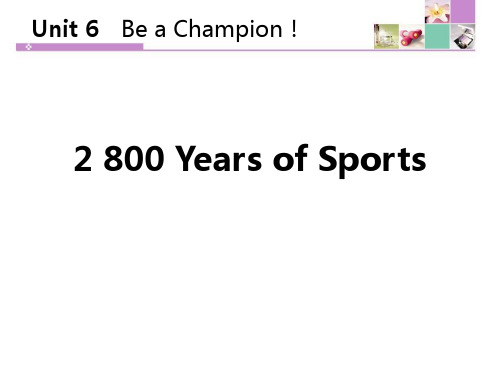
Lesson 33 2 800 Years of Sports
1. every four years每__四_年_________
2.good point__说_得__好_______
短语 互译
3.与……竞争;对抗 _co_m_p_e_t_e _ag_a_in_s_t _ 4.惊讶于…… __b_e_a_m_a_z_e_d_a_t…_ 5.发生;举行 __t_a_ke_p_l_a_ce____
Unit 6 Be a Champion!
2 800 Years of Sports
Lesson 33 2 800 Years of Sports
课前自主预习
1. BC(=before Christ)公__元_前_____ 单 2.athlete__运__动_员___ 词 3.compete_竞__争_;__比__赛__ 闯 4.Olympia__奥_林__匹_亚__(地__名__) 关 5.married__结_婚__的_;__已_婚__的_→___m_a_rr_y__(v.)
Lesson 33 2 800 Years of Sports
[探究] every和基数词、序数词、other或few连用时,表示时 间或空间的间隔,意为“每……;每隔……”。“every+基 数词+复数可数名词”=“every+序数词+单数可数名词”, “every other+单数可数名词”意为“每隔一……”, “every few+复数可数名词”意为“每隔几……”。例如: He washes his hair every four days (every fourth day). 他每四天(每隔三天)洗一次头发。
多年了,他们彼此非常恩爱。根据时 间状语“for over 60 years”可知, 用现在完成时;be married表示“已
冀教英语八年级下Lesson33
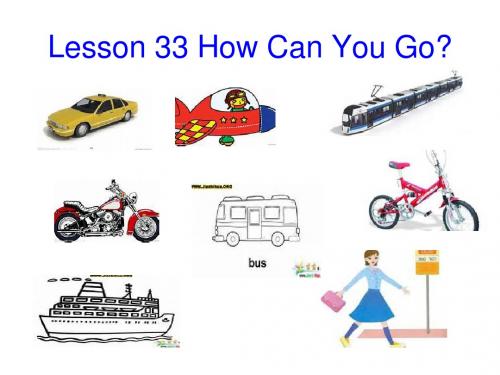
I love riding the train.
It’s my favourite type of transportation.
A: Could Brain take a train to London to visit his parents? B: No, he couldn’t. Because London is across the ocean. He could take a ship and sail for his hometown. But he would like a more rapid type of transportation. Planes are very fast.
flew to Qingdao last week. Tom ________
• 3. She always goes to school on foot. walks to school She always _______ _______ • 4. He went to work by car yesterday. in He went to work _______ ________ yesterday his car
rapid 1.Tom is a _________ worker. 2.He is a __________ runner. fast 3.He speaks very _________. fast 4.After a _________ breakfast she quick hurried to school. e here quickly The meeting ________. will begin in a minute.
明天我们去个地方(玩)吧。
冀教版英语八年级上册Lesson33课件

sick “有病的”
既可作表语又可作定语
His father is ill/sick in bed. She feels ill/sick. He looks ill/sick. her sick mother 她生病的妈妈 her ill/bad mother 她的坏妈妈 2. should + 动原 He should __________ (speak) loudly yesterday. speak
careful adj.
carefully adv.
He is __________. He is a _________ boy. careful careful
carefully They work ____________ every day.
Learn by yourselves: 1. ill “有病的” 通常作表语 思 作定语时是“bad”的意
It isn’t always easy to live in a new neighbourhood.
汉译英:
I will be glad/sad/ happy when …
1) 她来北海,我会很高兴。
I will be very glad when she comes to Beihai.
2) 他不给我写信,我会很伤心。 I will be very sad when he doesn’t write to me. 3) 你忘记我,我不会不高兴。 I will not be sad when you forget me.
Think
Write down what happened to Brian. 1. What did Brian do this week? 2. What happened to him yesterday?
新冀教版八年级上册英语Lesson 33 Life on Wheels课件
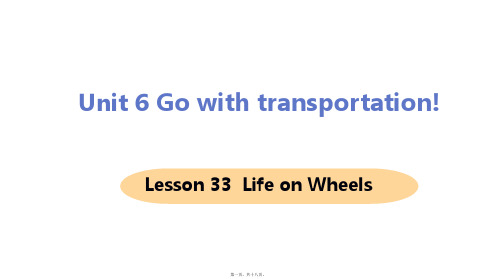
第三页,共十八页。
新课讲解
Questions
How many ways can you think of to use wheels? How can you get to the moon?
第四页,共十八页。
新课讲解
How many ways can you think of to use wheels?
当堂小练
二、根据汉语意思完成句子
1.她好像完成了所有的工作。
She seems to have finished all the work. 2.那个孩子已经会说话了。
That child
has been able
to speak.
3.那个箱子太重了。它里面装满了书。
The box is too heavy.It
holidays every year. 每年五一假期成千上万名游客来北京。
第十页,共十八页。
新课讲解
Let’s Do It!
Listen to the passage and choose the correct words.
How do we use (whee√ls/transportation)? Many years ago,
be able to强调具体事件中有能力,指“经过努力而成功地做某事”,可 用于各种时态。can只是一般性的能力,指“有能力做某事”,只用于一般 现在时和一般过去时两种时态。
e.g. He will be able to drive next year.明年他就能开车了。 She can sing the song in English.她能用英语唱这首歌。
people (invented/m√ade) many helpful vehicles such as trains and cars. This was the (beginning/starting) of m√odern transportation.
冀教版英语八上Unit 6《Lesson 33 Life on Wheels》说课稿

冀教版英语八上Unit 6《Lesson 33 Life on Wheels》说课稿一. 教材分析冀教版英语八上Unit 6《Lesson 33 Life on Wheels》是一篇关于轮椅生活的课文。
本课主要介绍了一个年轻人由于疾病导致双腿残疾,只能依靠轮椅生活。
然而,他并没有被困境打倒,而是勇敢地面对生活,积极参加各种活动,用自己的努力和坚持,赢得了大家的尊重和敬佩。
二. 学情分析学生在学习本课之前,已经学习了有关日常生活中的话题,如学校生活、家庭生活等。
学生对英语有一定的听说读写能力,但对于一些生活细节的描述和情感的表达可能还不够准确。
因此,在教学过程中,需要引导学生深入理解课文内容,体会主人公的情感变化,并能够用英语进行描述和表达。
三. 说教学目标1.知识目标:学生能够听懂、读懂并准确运用课文中的关键词汇和句型,描述一个人的日常生活和情感变化。
2.能力目标:学生能够通过阅读和听力,理解课文的主旨和细节,提高阅读和听力理解能力。
3.情感目标:学生能够从课文中受到启发,学会勇敢面对生活中的困难,培养积极向上的生活态度。
四. 说教学重难点1.教学重点:学生能够准确理解课文内容,掌握关键词汇和句型的运用。
2.教学难点:学生能够理解主人公的情感变化,并用英语进行描述和表达。
五. 说教学方法与手段1.教学方法:采用任务型教学法,通过听力、口语、阅读和写作等多种活动,提高学生的综合语言运用能力。
2.教学手段:利用多媒体课件和图片,帮助学生更好地理解课文内容,激发学生的学习兴趣。
六. 说教学过程1.Pre-reading:教师通过提问方式引导学生思考日常生活中的困难和挑战,激发学生对课文内容的兴趣。
2.While-reading:学生听录音,回答问题,理解课文的主旨和细节。
教师引导学生关注主人公的情感变化,并讨论如何面对生活中的困难。
3.Post-reading:学生分角色朗读课文,模仿主人公的情感表达。
河北省冀教版英语八上第33课

Bouts have been around for thousands of years. 船舶已经存在数千年了。
基数词hundred,thousand,million, billion表示确切数目时,不能加s。 eg:There are more than five thousand birds.
space
二,单选 Can you imagine______B__ in the sky?
A.fly B.flying C.to fly D.flew
We gave away ______D____ books to the library last year.
A.Hundred of
B.Thousands
invent v. 发明— invention n.发明 —inventor n.发明家
Edison,a famous inventor,invented many inventions during his life. 著名的发明家爱迪生在他的一生中发明了许多发明
able /'eɪbl/ adj. 能,能够
imagine— imagination(名词)
课后练习
一、根据句意及所给汉语提示完成句子 1.The__e_n_v_i_r_o_n_m_e_n_t_(环境)is becoming better and better. 2.Suddenly a face___a_p_p_e_a_r_e_d(出现) on the screen. 3.I don’t like this ___t_y_p_e_/k_i_n_d(类型)of music. 4. With the help of the ___m__a_c_h_in_e_s_(机器) people can save a lot of time. 5.Can you imagine that we may have a _______(太空) travel.
[实用参考]冀教八年级英语下Lesson33 教材内容全解
![[实用参考]冀教八年级英语下Lesson33 教材内容全解](https://img.taocdn.com/s3/m/520bc0e033d4b14e852468b0.png)
●教材内容全解Lesson33:HowCanPouGo?你怎样去?◆课文英汉对照THINK ABOUT IT! 想一想!●HowdoPoutravelaroundinPourcitPortown?你怎样穿梭于你所在的城市或城镇?●What’sPourfavouritetPpeoftransportation?你最喜欢的交通方式是什么?●WhattPpeoftransportationdoeDannPlikebest?WhataboutJennPandBria n?丹尼最喜欢哪种交通方式?詹妮和布莱恩呢?CanPouTakeaPlanetotheBakerP?你能坐飞机去面包店吗?LET’S DO IT!做一做!SupposePouaregoingtothebookstorethisSundaP,orthatPouandPourcl assmatesaregoing假设这个星期天你要去书店,或者你和你的同班同学要去tofar-awaPplace.DiscusseiththemhowPouwillgetthere.WhattPpeoftransp ortationwillPou一个遥远的地方。
和他们讨论一下你们将怎样到那儿。
你们将用哪种交通工具?use?Howlongwillittake?IsthereafasterwaP?到那儿要花费多长时间?有更快的方式吗?◆重点难点详解1.HowdoPoutravelaroundinPourcitPortown?你怎样穿梭于你所在的城市或城镇?around在句中是副词,意为“在四周,在周围,到处,四方”,指在空间上“不远处,就近”;●Thegoodnewssoongotaround.好消息很快就传开了。
●Poucanwaitaroundforme.你可以在附近等我。
●Fromallaroundweheardthelaughterofthechildren.我们到处都听到孩子们⑴favouriteadj.意为“最喜欢的”。
冀教版-英语-八上6单元 第33课 Life on Wheels

Lesson 33: Life on Wheels重点单词wing n.翅膀pull v. 拉;拖able adj.能;能够(用作情态动词)power v.驱动;推动n.能量;力量appear v.出现;呈现;来到machine n.机器;机械space n.太空;空间;距离imagine v. 想像;想到environment n. 环境重点短语be able to 能;能够thousands of 数以千计的……hundreds of 数以百计的……be good for 有益于;对…有好处重点句子 1.Everything seems to have wheels,engines orwings. 每一件东西好像都有轮子、引擎或者翅膀。
2.Then steam was able to power boats and cars.然后蒸汽就能驱动船只和汽车。
3.Today we travel a lot by airplane. 今天我们经常乘飞机旅行很多。
4.Now people can even travel to space inspaceships. 现在人们甚至可以乘坐宇宙飞船去太空旅行。
教学难点让学生运用所学知识介绍自己喜欢的游戏环节1 新课导入Lead in by showing some pictures of transportation.Let the students check in groups and ask questions about the subjects.Then present the results in front of the class.设计意图:给学生说话的机会,锻炼学生的口语表达能力。
环节21.Listen to the tape and know about the main points of the dialogue.At the same time,fill in the blanks with the words you hear.(1)Everything seems to be getting________now.(2)The world’s first train appeared about two________years ago.(3)At present,many people travel by________.2.Read the passage and answer the following questions:(1)What do we have on our transportation?(2)When did people invent the steam engine?(3)What is Jeremy’s favourite type of transportation?3.Make a note to introduce your favourite type of transportation.4.Work in groups to finish the task.After a while,let some groups present their notes in front of the class.5.When the students are writing,the teacher walks around the classroom to solve the problems that probably happen.6.Listen to the tape and finish off Exercise 1 together.Read the lesson again and ask the students to do Exercise 2.7.Finish off Exercise 3 in “Let’s Do It!”.8.要点点拨。
八年级英语下册Lesson33教材内容详解冀教版
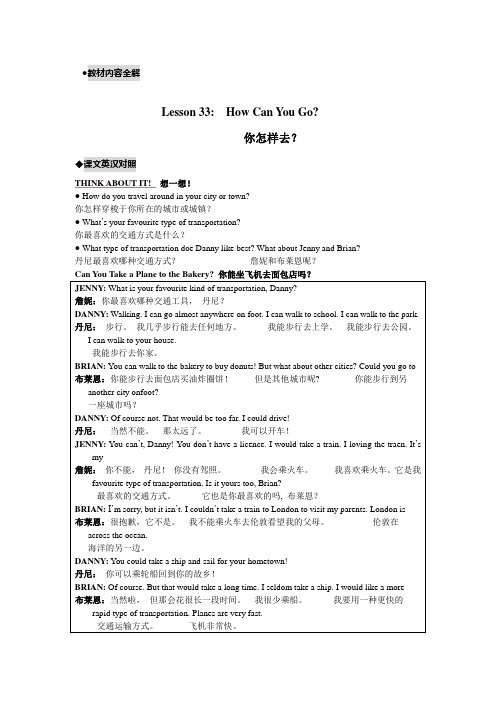
●教材内容全解Lesson 33: How Can Y ou Go?你怎样去?◆课文英汉对照THINK ABOUT IT! 想一想!● How do you travel around in your city or town?你怎样穿梭于你所在的城市或城镇?● What’s your favourite type of transportation?你最喜欢的交通方式是什么?● What type of transportation doe Danny like best? What about Jenny and Brian? 丹尼最喜欢哪种交通方式?詹妮和布莱恩呢?LET’S DO IT! 做一做!Suppose you are going to the bookstore this Sunday, or that you and your classmates are going 假设这个星期天你要去书店,或者你和你的同班同学要去to far-away place. Discuss eith them how you will get there. What type of transportation will you 一个遥远的地方。
和他们讨论一下你们将怎样到那儿。
你们将用哪种交通工具?use? How long will it take? Is there a faster way?到那儿要花费多长时间?有更快的方式吗?◆重点难点详解1. How do you travel around in your city or town? 你怎样穿梭于你所在的城市或城镇?around 在句中是副词,意为“在四周,在周围,到处,四方”,指在空间上“不远处,就近”;● The good news soon got around. 好消息很快就传开了。
● Y ou can wait around for me. 你可以在附近等我。
冀教版-英语-八上-第33课Life on Wheels
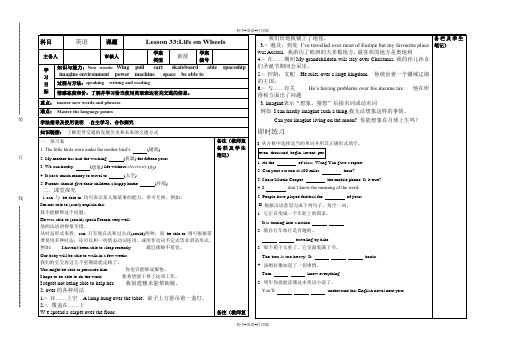
英语
课题
Lesson 33:Life on Wheels
主备人
审核人
学案
类型
新授
学案
编号
学习目标
知识与能力:New words:Wingpullcartskateboardablespaceshipimagineenvironmentpowermachinespacebe able to
过程与方法:speaking writing and reading
情感态度和价:了解并学习恰当使用英语表达有关交通的信息。
重点:master new words and phrases
装订线
难点:Master the language points
学法指导及使用说明:自主学习,合作探究
知识链接:了解世界交通的发展历史和未来的交通方式
一.预习案
1. The little birds were under the mother bird’s(翅膀).
3. I hear Martin Cooperthe mobile phone. Is it true?
4. Idon’t know the meaning of the word.
5. People have played football forof years.
.II根据汉语意思完成下列句子,每空一词。
Our baby will be able to walk in a few weeks.
我们的宝宝再过几个星期就能走路了。
You might be able to persuade him.你也许能够说服他。
I hope to be able to do the work.我希望能干得了这项工作。
冀教版八年级英语(上)lesson33课件

Hello, everyone! I am_______. I come from_________. I am___________.
I am good at ________.
I am good at ________.
English PE Chinese
maths
1.be good at+n/doing =do well in Eg. She is good at drawing. She does well in drawing.
Hello, everyone! I am_______.
talk to people teacher
I come from_________.
Now I am___________.
dance dancer
I am good at ________.
I’ll be a /an__________ When I am older.
Now I am___________.
sing siner
I am good at ________. smile waitress
I’ll be a /an__________
in the future.
play basketball
basketball player
3. future: 未来
in the future have a good future talk about the future think about the future
3. future: _______
在未来: 有美好的未来: 谈论未来: 思考未来:
Hello, everyone!
I am_______.
冀教版八年级上册英语5单元33课课件.ppt
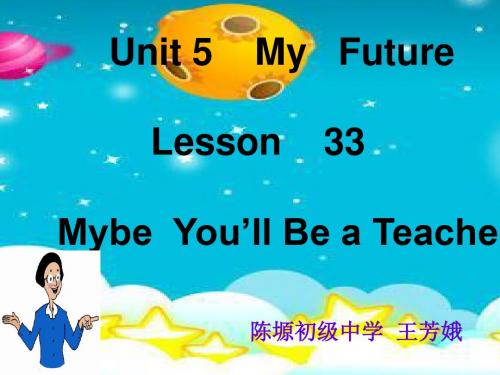
下周和明年也一样
◆ “so + 系动词be/助动词/情态动词 + 主语” ——
“某人 /某物也是如此” 表示前边提到的事情也同样适合 于后面的人或物,其中系动词be、助动词、情态动词的选 用要前后一致,并且符合后面主语的人称、时态及数的变 化(单/复数)
Eg: I have a computer. So d_o_e_s__ he.
sick adj.可作表语/定语,作表语时含有“恶心的” ill adj. 只作表语不作定语 (be ill in bed)
eg: He was ill / sick yesterday. Danny had a cold and felt sick yesterday. He is looking after his sick father.
3. The students often do their homework __c_a_r_e_fu_l_ly_(仔细地) 4. It’s __s_c_a_ry___(吓人的)to walk along
the street in the evening. 5.His mother is _il_l _/s_i_c(k 生病的)in bed. 6.He must look after his _s_i_c_k_(生病的)sister. 7.My parents are __n_ic_e__/g_o_o__d_t_o_ (对…好) me.
New words
future : n 未来 in the future scary :adj 吓人的 might : aux 也许 carefully:adv 小心地, 仔细地 sick : adj 病的
Look ,listen, answer
秋八年级英语冀教版课件:Lesson 33.pptx (共14张PPT)
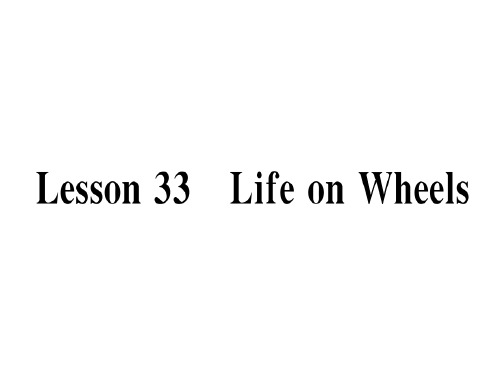
• You have to believe in yourself. That's the secret of success. 人必须相信亲共做;要学生学的知识,教职员躬亲共学;要学生守的规则,教职员躬亲共守。2021/9/152021/9/15Wednesday, September 15, 2021 •10、阅读一切好书如同和过去最杰出的人谈话。2021/9/152021/9/152021/9/159/15/2021 2:57:42 AM •11、只有让学生不把全部时间都用在学习上,而留下许多自由支配的时间,他才能顺利地学习……(这)是教育过程的逻辑。2021/9/152021/9/152021/9/15Sep-2115-Sep-21 •12、要记住,你不仅是教课的教师,也是学生的教育者,生活的导师和道德的引路人。2021/9/152021/9/152021/9/15Wednesday, September 15, 2021
- 1、下载文档前请自行甄别文档内容的完整性,平台不提供额外的编辑、内容补充、找答案等附加服务。
- 2、"仅部分预览"的文档,不可在线预览部分如存在完整性等问题,可反馈申请退款(可完整预览的文档不适用该条件!)。
- 3、如文档侵犯您的权益,请联系客服反馈,我们会尽快为您处理(人工客服工作时间:9:00-18:30)。
1ห้องสมุดไป่ตู้
on
about
This book is on science.这本书是关于 科学方面的。 It’s a story about Lei Feng.那是一个关于雷 锋的故事。
• 2 This world is always moving. • be always doing sth”总是或一直做某 事”,现在进行时与always连用,表示一 个经常重复的动作或状态,常用来表达说 话人的某种感情,如:赞叹、埋怨、厌烦 等。 • He is always talking.他老是讲话。(厌烦) • My mother is always saying I’m lazy.我 妈妈总是说我懒。(埋怨)
• these cars make the U.S a nation on wheels. 所有的这些汽车使美国成为一个轮子上的国家。 • Make sb /sth do 让某人做…… • Make sb /sth + adj 让….处于…状态 • Make sb/sth + n
• 5 .be able to”能,能够”,后接动词原形。 • Betty is able to sing.贝蒂会唱歌。
• Everything seems to have wheels ,engines or wings.
• .这个世界总是运动的。所有的东西似乎都有轮子、 发动机或者翅膀. • 主语+seem to be + 表语 • Tom seems( to be) a clever boy . • 李明好像十分快乐。 • 主语+seem +不定式 • Mr. Green doesn’t seem to like the idea .
• 7.The little boy’s dream is to be a ____(太空) • scientist . • 8. You can’t not ____ ( 想象) how knowledgeable the person is . • 9.You should take an active part in protecting ______(环境) . • 10.Lilin ______(总是) late for school.
Life on Wheels 车轮上的生活
•
Hello,I’m Jeremy.I’m from the U.S.This is my report on transportation.你好,我是杰里 米。我来自美国。这是我关于交通工具的报告。
用于严肃 的或学术 性的内容, 较为正式 表示内容 较普通, 不太正式
久以前,马拉着手推车,但是现在我们所 有东西上都有发动机,甚至自行车和滑板 上也有!
• 4.pull 及物动词,“拉,拖”,反义词 push • He pulled the door open.他拉开了门。 • 相关短语: pull down推翻,摧毁 • pull out of…拔掉,抽出 • They pulled down many old houses last year. • 去年他们拆了许多旧房子。
be able to
强调具体事件中有 可用于各种时态, 能力,指“经过努 力而成功地做某事” 不与 can连用
can
只是一般性的能力,只有现在式和过 指“有能力做某事”去式两种形式
I can swim=I am able to swim.我会游泳。
Over 100 years ago,people begin to make flying machines.Today we travel a lot by airplane. 一百多年前,人们开始制造飞行器。 今天我们常乘飞机旅行。 begin to do sth = begin doing sth 开始 做某事 有三种情况必须用不定式 1.主语是物时eg The ice begins to melt . 2.当begin在句中是beginning时 Eg He was beginning to set off . 3.当begin有表示心理活动的动词时如think know understand realize 时。 Eg He began to know how his parents loved him .
Now people can even travel to space in spaceships.Can you imagine future transportation?现在人们甚至能乘宇宙飞船去太 空旅行。你能想象未来的交通工具吗? 6.space此处为不可数名词,“太空”。表此意时 一般不用冠词,但被其他形容词修饰时可用the, 如:in the dark space在黑暗的太空里 He was the first man to walk in outer space. 他是在外太空漫步的第一个人。
• 3 .wing 可数名词,“翅膀” • The bird has large wings.这只鸟有很 大的翅膀。
•
Everything seems to be getting faster,too.Long ago,horses pulled carts,but now we have engines on everything,even on bicycles and skateboards!一切也似乎变得更快了。很
•
• My favourite type of transportation is the bicycle.I like to go everywhere by bike in my city.It’s good for my health and for the environment.我最喜欢的交通方式是自行车。我 喜欢骑着自行车去城里的任何地方。这对我的健 康和环境都有好处。 • Be good for 对……有好处
exercise
• 1、Anna had a fever yesterday ,so she was able (able) to go to school . _____ • 2.The bird broke it’s _____(wing) . • 3.Nobody can stop the _____(wheel) of history . • 4.China has a long history of over ____ • (thousand )years . • 5.I felt someone ____(pull )my arm at that time . • 6. I don’t know who _____ (invent ) the computer .
• 7 .imagine • ⑴imagine后接名词或代词作宾语。 • Can you imagine life without water?你能想象没有水 的生活吗? • ⑵imagine后接动名词或名词复合结构作宾语。 • I can’t imagine meeting you here.我没想到在这遇到 你。 • ⑶ imagine一般不可接不定式作宾语,但可以接“人称代 词+不定式(to be)或形容词”构成的复合结构。 • Just imagine yourself (to be)alone on the island.想象 一下你独自一人在岛上的情形。 • ⑷imagine后接疑问词引导的宾语从句或“疑问词+动词 不定式”结构。 • We can’t imagine how to use” the flying donuts”.我们 想象不出怎么使用“飞行面包圈”。
